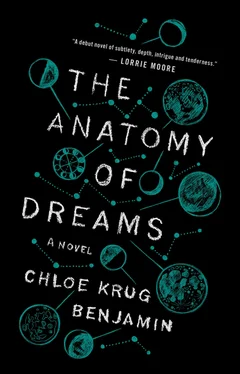A faint ticking noise comes from the kitchen. Through the open archway, I see an octagonal wooden clock. The hands point to the place where five o’clock should be, but the numbers are heaped in a jumble at the bottom of the clock’s face. At the top, in block letters, are the words WHO CARES?
“I want to understand how it happened,” I say. “I want to know how I did what I did.”
“I doubt I can tell you anything that you don’t already know.” He takes off his glasses and rubs his nose—that old, familiar gesture. “You were unusual; you had both the fine motor skills of a sleepwalker and the vivid dreams of an RBD patient.”
“Parasomnia overlap disorder,” I said.
Keller nodded. “A fascinating case. As a sleepwalker, you were remarkably skilled: your mobility and speech as advanced as I’ve ever seen. An observer—uninformed, of course—might have thought you were awake.”
“I tried to figure out whether I was dreaming. I thought I must have been, because I kept seeing Meredith. How was that possible?”
Keller raised his eyebrows.
“Sleepwalkers can interact with the real world, but visual hallucinations aren’t uncommon. You were dexterous and agile, clearly able to communicate, but you were still asleep. It stands to reason that your mind would incorporate some things that were real and some that were not. That’s part of the reason why the disorder can be so dangerous.” He sighed. “But you were on the brink of lucidity. If you had only stayed with us until the end of the semester—even another month—I think you would have achieved it.”
“Yeah? And what would have happened then?”
Keller’s eyes were far away. He stroked the skin beneath his chin.
“My guess is that an opportunity would have been created—space for your conscious and subconscious minds to reconcile. Once you became consciously aware of your subconscious activity, your sleep disorder could have resolved—and, aired in the aboveground arena of the consciousness, your repressed urges might have followed suit. Lucidity could have made you aware of the moment when you left your bed for the neighbor’s house, for example; ideally, you would have been able to stop yourself. But if I knew with any certainty, I doubt we’d be sitting here now.”
“No. You’d be the head of the neuroscience department at a cushy university, wouldn’t you? Sitting in a choice office with a spectacular campus view? And where would I be?”
Keller doesn’t blink. “In the office down the hall.”
“That’s absurd. You really think you would have gone to the university, put out a press release, told them your most successful experiment revolved around your assistant? The scientific community would have laughed in your face. And there’s something else I don’t understand.”
Keller is quiet. He watches with interest as I inhale and begin again.
“There were too many clues. That’s what I keep thinking about—how I didn’t figure it out sooner. You knew I was assigned to the file reorganization project, but you didn’t hide Meredith’s file. You asked me about my nightmares, and you had Gabe drop hints, ask me whether I was lucid or if I saw my hand.”
The hall falls into shadow as a cloud passes over the sun. Keller settles farther back in his chair.
“So I have this theory,” I say. “I think you wanted me to know about it. I think your time was running out, and you were getting impatient. So you nudged me. Dropped a hint here and there. Tried to get me to realize something I wouldn’t on my own.”
“We were experimenting,” says Keller, “with methodology.”
“Methodology. You should be jailed.”
His face still doesn’t change. But he crosses one leg over the other and clasps his hands, pulling his elbows toward the chair, as if retracting into himself.
“You’re lucky,” I say. “You’re lucky I still have a shred of loyalty to you. I can’t say why.”
“Sylvie. What is it you wanted out of this visit? Did you want to see me stripped, displaced, an old man living alone?”
“I want to know what you’ve learned ,” I hiss. “Your wife kills herself, you manipulate your own researcher, you’re practically an accessory to murder, and then you abscond to Martha’s Vineyard. So what did you learn, Adrian? Where has all of this high-minded research gotten you? Was it worth it?”
I stand, my jaw locked with something like despair. I’ve fantasized so many times about saying these things to him—telling him off, cutting him down, watching his face fall and his veneer crack. In real life, though, it doesn’t feel good. It feels humiliating—for each of us individually, for both of us together. I think of the time in my sophomore year of college when, home for the holidays, I opened the bathroom door to find my father getting out of the shower. He squawked, pulling the shower curtain around him, but it was too late. The curtain was clear. We never spoke of it again.
Keller stands, too, pushing with effort out of the recliner.
“I have to believe that it was,” he says.
The sky is warming in color: the sun rusty and smudged, the horizon line a ribboned, bloodshot red. When I was driving from Berkeley to Martha’s Vineyard—beneath the orange stalks of the Golden Gate Bridge, through Nevada’s feverish lights and across the northern plains of Missouri—I imagined how I would leave Keller’s house: a slammed door, a final word, a look I’d make sure he’d remember.
Reality, though, is never so satisfying. He walks me to the door and opens it. Then he pauses, one hand on the knob.
“I’m terribly sorry,” he says.
Perhaps it is an act of generosity: the gift of closure, however belated. Perhaps, pulled by the yoke of conscience, he wants deliverance himself. But I detect, too, the peevishness of a child pushed forward by a parent and forced to apologize.
I look at him without responding. Then I step outside into the wild, green dune grass and climb back to the car. I’m ready to go home.
22. SEATTLE, WASHINGTON, 2009
A year ago, I visited Rodney in Seattle, where he works for a start-up that develops games for smartphones. All of the games are supposed to offer mental and physiological benefits. Rodney had spent the past year developing ShepherdZZZ, a game that is literally supposed to put you to sleep: the objective is to shepherd a lost, hyper sheep back to its herd via a battery of dizzying obstacles so overstimulating that most users are exhausted in less than fifteen minutes.
Rodney picked me up at the airport in a Zipcar. He’d inherited our father’s height and our mother’s quick hazel eyes; his hair was shoulder length, tied back in a short ponytail. He looked more mature than I’d ever seen him and also, somehow, impossibly young.
“It’s basically a dream job,” he said, pulling onto the highway. “Initially, there were like, four employees, and now there are thirty of us, running around like gerbils. But the really great thing is that it’s so innovative. It’s like a baby Google. Baby Apple. I mean, we get creativity time. And paternity leave!”
“What’s creativity time?”
“You know,” he said, waving one hand. “Creativity time? A bunch of companies are doing it. It’s basically half an hour each day when we can play Ping-Pong or read for pleasure or wander around, lost in creative thought. It’s supposed to be really generative. We get paid for it.”
The week before, Rodney had e-mailed me the link for ShepherdZZZ, along with an employees-only free download code.
“It’ll save you the five dollars,” he said. “You need it.”
“The app or the five dollars?” I asked.
“Both, probably,” he said brightly. “Grad school and all.”
Читать дальше












